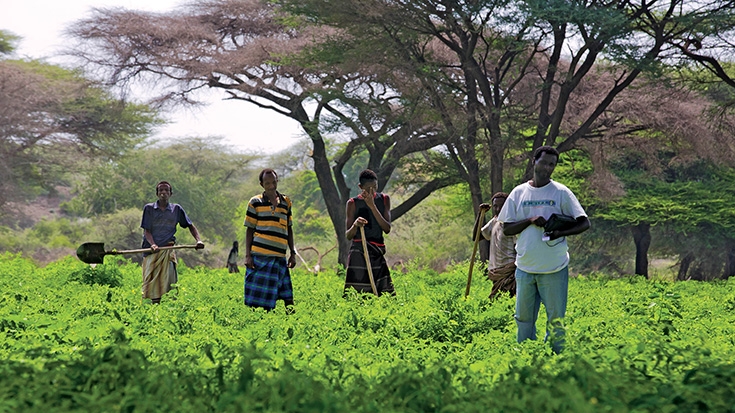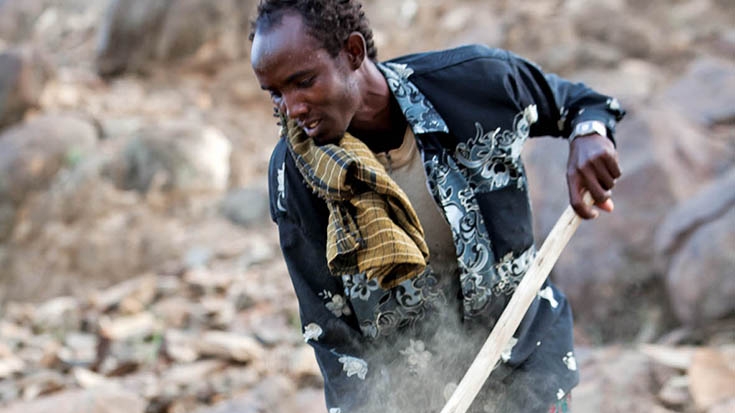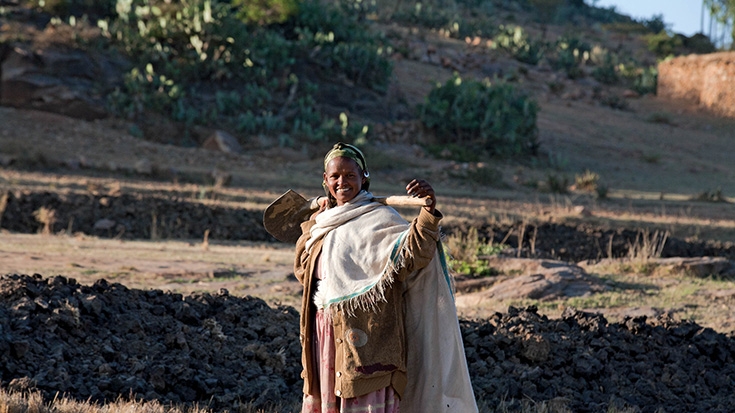Do you think having enough food to eat is your right? Would you be insecure if you did not eat today? Would you be in jeopardy if you did not have enough to eat for the rest of the month? If yes, then you consider food security as a human right.
Ethiopia’s Productive Safety Net Program (PSNP) is one such program that secures this right by ensuring that, during the leanest of periods, the most vulnerable are safe. It has helped food-insecure households not only hold on to their assets, but create new ones, such as local infrastructure and household savings, which will safeguard them from future shocks like repeated droughts.
Atsim Womberta’s story shows how it can be done. As one of more than 9 million PSNP clients, she receives cash payments in exchange for participating in public works projects – building roads or digging latrines, for example—and thus earns money to buy sufficient food for her family. Holding her spade across her shoulders, she says that now her family doesn’t have to live in constant fear of hunger.
The PSNP is a social protection program administered by the government of Ethiopia and is supported by the World Bank and its development partners. The program ensures food security and a minimum standard of livelihood among the most food-insecure populations in Ethiopia. This is a key endeavor in poor countries, where the population is vulnerable to sudden shocks like drought and food scarcity, which cause a wide range of illnesses and even deaths.
Zewdie Geletu, a PSNP participant who lives in Adami Tulu District, describes the challenges common to his community: “I was selected for the PSNP because of the terrible drought that our village faced for three consecutive years. Not only did I lose my livestock, there were no crops in the field.”
Ethiopia has had a long history of drought due to increasing dependency on rain-fed agriculture and years of extremely poor rainfall. For more than 30 years, the immediate response to food crises was food aid. Then, ten years ago, the government launched a Food Security Program, and the PSNP was born.
The public works program is a critical component of the PSNP. It supports communities to rehabilitate their natural environment through work on soil and water conservation and build essential community infrastructure like roads, schools and clinics. This approach has revived communities far beyond just providing food. Nearly 9,000 kilometers of roads stretch through regions where the program is active, helping transform local markets. Hundreds of schools and health clinics now serve PSNP regions, built by PSNP beneficiaries.
Food Gap Falling
Ethiopia’s PSNP has reported remarkable success and serves as a model for safety net programs worldwide, says Sarah Coll-Black, World Bank Senior Social Protection Specialist. For example, the food gap has fallen significantly in the highland regions of the country, where the program operates. In 2006, the average household had 8.4 months of food security; by 2012, food security had increased to 10.1 months.
World Bank impact evaluations conducted in 2010 and 2012 showed that PSNP clients participating in public works programs for five years experienced a 1.05 month increase in food security, compared to comparable households who did not participate. In addition, the percentage of PSNP clients participating in public works programs who reported 12 months of food security increased from 16.8% in 2006 to 36.2% in 2012.
“The direct effect of PSNP transfers to poor households has had a considerable impact on reducing poverty,” says Coll-Black.
A 2014 World Bank fiscal incidence study examines how much poverty was reduced as a result of providing transfers through the program. The study suggests that the direct effect of transfers alone reduces the proportion of households living in poverty by 6%; reduces the poverty gap index by 15%; and reduces the severity of poverty (squared poverty gap) by 30%.
Bank Accounts with Four Legs
Like bank accounts with four legs, sheep and goats are considered people’s savings and securities in rural Ethiopia. But in the agricultural highlands, these assets are useful only as a viable asset when a family is able to grow their herd by a minimum of ten, so they can breed the herd and also sell the animals. In the drier warmer lowlands, this number can go up to 40 or 50. Often, farmers are forced to sell their livestock to buy food, thereby depleting the little that they have.
The PSNP has been able to reverse that, says Amare Berhe of Adi Hutsa Kebele. “While there were some years when the crops did not do so well, the money I received through the safety net program meant I never had to sell anything. If I had not joined the PSNP, I would have had to sell my livestock.”



